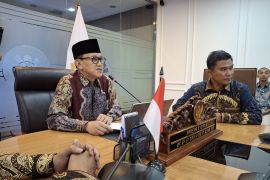According to a press statement issued by the Ministry of Foreign Affairs and received on Saturday, the repatriation will be divided into three groups.
"The first 13 people will be sent home on Saturday, March 3, with 11 people on Sunday, March 4, and the third group of 9 people on March 13. Those in the first wave will fly on Emirates Airways and will arrive at 3.45 pm," said Director of Information and Media of the Ministry of Foreign Affairs, PLE Priatna.
According to March 1 data from the Ministry of Foreign Affairs , there were still 332 Indonesian migrant workers seeking protection at the Indonesian Embassy in Amman.
"The Indonesian Embassy in Amman and the Ministry of Foreign Affairs keep trying to solve the migrant workers` problems in Jordan, with the numbers increasing day by day," said Priatna.
He further said the main problem confronting the Indonesian Embassy in Amman in repatriating Indonesian migrant workers was the "kafalah" regulation, a system that gives employers the authority to grant permission to their employees seeking to leave the country. This system is applied in Jordan and throughout the Middle-East, in general.
"According to this system, the Jordan immigration officer will be confirming with employers before issuing the exit permits to the migrant workers. If employers are not giving permission, then exit permits will not be issued and they will be stuck in the embassy," he said.
But, Priatna said RI`s Government was trying to process and return the Indonesian migrant workers in Jordan in the next few months. Further, the Indonesian Embassy in Jordan has sought to assist the residents living in the embassy shelter as much as possible.
The major problems faced by Indonesian migrant workers in the Middle-East are accusations of stealing and employment contract violations.
"We have discussed those problems with officials in Jordan and still keep trying to finish the long process and return them to Indonesia," said Priatna.
(A060/KR-BSR/F001)
Editor: Suryanto
Copyright © ANTARA 2012











